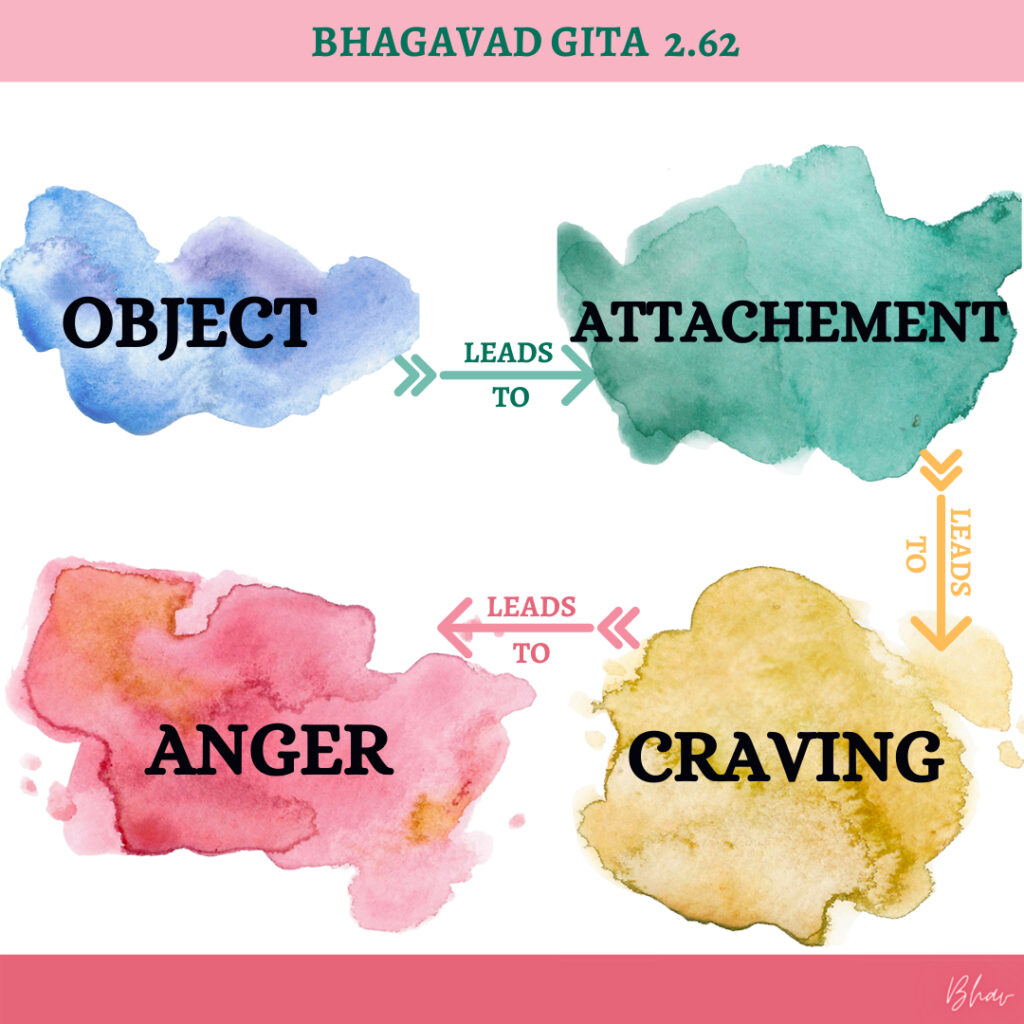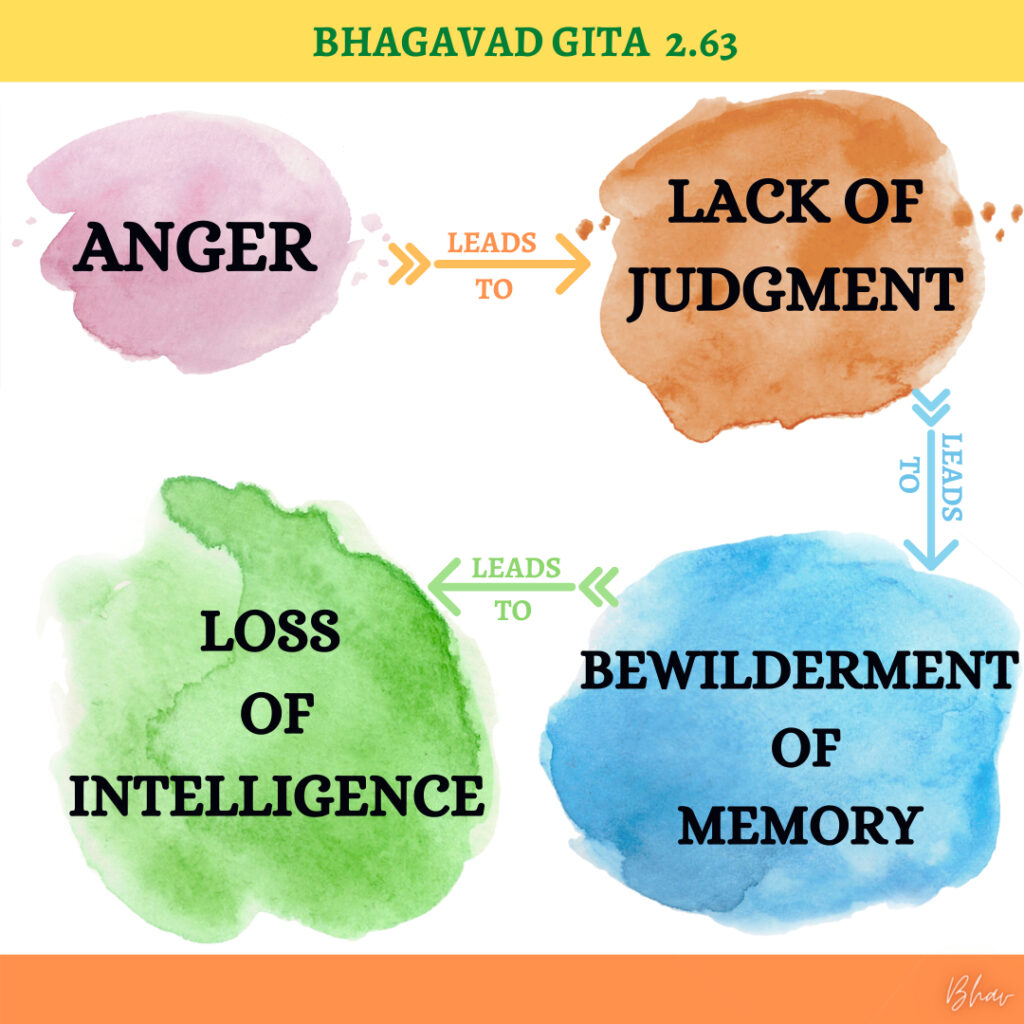By understanding the root causes and effects of any problem, we can easily navigate to the solution. Every solution lies in the problem. In this way, the manual of life, Bhagavad Gita, teaches us how to control anger.
Cause of Anger
As per the transcendental Bhagavad Gita (2.62):
- It all starts from a stimulus, i.e., a sense object (anything used as enjoyment or satisfaction of our senses).
- While contemplating on that, the person develops attachment for it.
- From that attachment, lust or craving originates as we wish to enjoy that again and again.
- When this craving is not fulfilled, anger arises.

Effects of Anger
In Bhagavad Gita (2.63), Lord Krishna says:
- Anger leads to complete delusion or loss of judgment.
- From delusion, memory is bewildered.
- When this happens, intelligence gets lost.
- And the person falls in this chain of events.

When we act in anger, krodha vegam, we do things that we regret later. In Bhagavad Gita (16.21), anger is considered a gateway to hell, and we are asked to avoid it to avoid suffering. Anything in excess causes harm and the same is the case with anger.
Way to Control Anger
By understanding the cause and effects, we can conclude that we can control anger by:
- Not being too attached to people, objects, power, money, etc.
- Understanding the science of the soul.
- Consciously reducing and changing our endless material desires.
- Differentiating between needs and desires.
- Taking help from God, meditating, and praying.
- Pausing for a while and thinking of the consequences of anger.
- Controlling the mind by making it our best friend (BG 6.6).
- Instilling better qualities (BG 16.1–3).
- Reading Bhagavad Gita and other spiritual books that remind us of the right path.
- Having a role model to seek inspiration from and a mentor who can train and guide us.
- Putting good inputs (hearing, listening, reading, watching the right content) in mind to get better outputs (knowledge, bliss, peace, satisfaction).
- Staying away from addictions and bad habits.
These are some of the ways that can help to overcome excessive, undesirable anger. Though, the best way recommended by Vedic scriptures and great sages to overcome all negative emotions and receive eternal bliss is by chanting the name of the Lord.
In one who dwells longingly on sense objects, an inclination towards them is generated. This inclination develops into desire, and desire begets anger.
(BG 2.62)
If we examine our own lives, we find that the greatest cause of sorrow is this: we take up something, and put our whole energy on it—perhaps it is a failure and yet we cannot give it up. We know that it is hurting us, that any further clinging to it is simply bringing misery on us; still, we cannot tear ourselves.
— Swami Vivekananda (CW, 2:2)
Anger generates delusion, and delusion results in loss of memory. Loss of memory brings about the destruction of discriminative intelligence, and loss of discriminative intelligence spells ruin to a man.
(BG 2.63)
Each time we suppress hatred, or a feeling of anger, it is so much good energy stored up in our favour; that piece of energy will be converted into the higher powers.
— Swami Vivekananda (CW, 1:223)
A man of disciplined mind, who has his senses under control and who has neither attraction nor aversion for sense objects, attains tranquillity, though he may be moving amidst objects of the senses.
(BG 2.64)
All outgoing energy following a selfish motive is frittered away; it will not cause power to return to you; but if restrained, it will result in development of power. This self-control will tend to produce a mighty will, a character which makes a Christ or a Buddha.
— Swami Vivekananda (CW, 1:33)
On attaining tranquillity all one’s sorrows come to an end. For soon does the intellect of a tranquil person become steady.
(BG 2.65)
Let us be at peace, perfect peace, with ourselves, and give up our whole body and mind and everything as an eternal sacrifice unto the Lord… Day and night let us renounce our seeming self until it becomes a habit with us to do so… Go then into the midst of the battlefield, with the roaring cannon and the din of war, and you will find yourself to be free and at peace.
— Swami Vivekananda (CW, 1:102)
Related Articles: